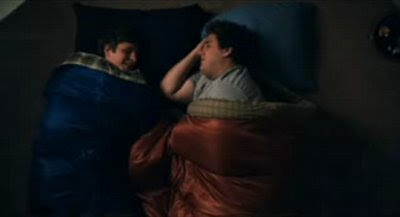
Justin Shubow has a fun article up at National Review on “the man-crush romantic comedy”, a genre that has emerged in recent years thanks to films like Wedding Crashers, I Now Pronounce You Chuck and Larry and Superbad. Among its insights:
Having been described in these ways, there can be little doubt that the friendship at the center of all three movies follows the conventions of the romantic comedy, with the exception of the meet cute. In lacking that sort of an introduction, the movies are specifically versions of the romantic comedy of marriage, in which the central question is whether the already-existing couple can stay together.
Another convention in all three movies that is worth noting is the sexually exhausted male, spent from behavior or desire, who becomes civilized by settling down with a virtuous female. But though that theme is common to traditional romantic comedies, which are fundamentally about the transformative power of love, in these films the transition from cad to gentleman is additionally, even chiefly, made possible by the cementing of the male bond; Platonic love, too, is shown to have life-altering effects.
While of course previous buddy flicks have shared some similarities with romantic comedies, only the recent crop fully (and perhaps self-consciously) completes the genre’s checklist. Most significantly, only in these newer movies is the relationship both overtly affectionate and sealed with explicit declarations of love. Since the feelings expressed are real and not one of the jokes, the movies show themselves to be borrowings from, not parodies of, the genre. . . .
But there might be a deeper reason for the advent of the man-crush rom com. In these extremely unromantic times . . . in which serial monogamy followed by divorce-prone marriage has become the norm, living happily ever after has become a less and less believable fantasy. By contrast, “best friends forever” is not just a live possibility, it’s one that is widely lived. And when romantic relationships are impermanent, life-long friendship becomes one of our few consolations. Admittedly, such an interpretation is an awfully heavy take on light entertainment. But if one looks past the full-frontal vulgarity, even the most immature comedies might be capturing a contemporary truth: Outside the family, anyone looking for undying words of devotion might just have to settle for “I love you, man.”












